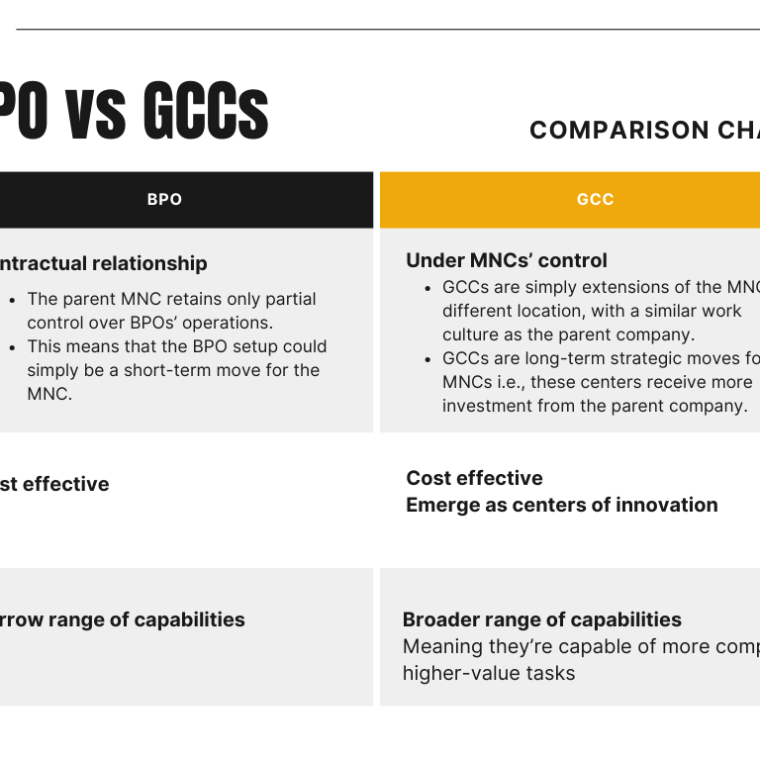Global Capability Centers aka GCCs are fast emerging as the face of India’s new-age IT boom.
For a long time, BPOs have been synonymous with India’s IT boom of the 1990s. Over the years, the strategy of MNCs moved away from merely outsourcing to offshoring. With this shift, another business entity is fast emerging as the face of India’s new-age IT boom- the GCCs.
GCCs/Global Capability Centers, also known as Global In-house Centers (GICs) or Global In-house Captives are offshore centers of multinational companies. These centers provide support services to their parent companies in a wide range of areas such as IT, finance, analytics, human resources, etc.
How are they different from BPOs?
Both GCC and BPO fall within the realm of outsourcing and offshoring, but there are some key differences between them:
[Insert the image]
GCCs in India
In 1985, India was home to just one GCC. Now, with more than 1,800 GCCs employing over 1.3 million people, India is a global GCC hotspot. Nearly 50% of the world’s GCCs are in India- the location of the largest cluster of Fortune 500 GCCs in the world.
The key reasons behind this inflow of GCCs:
- Availability of skilled digital talent- India boasts the world’s 2nd largest digitally skilled talent pool.
- Dynamic start-up ecosystem
- Favorable service provider ecosystem
- Cutting-edge research by the Indian academia
In recent times, and the coming years, a trend of specific interest to the job market is emerging- GCCs are expanding into tier II cities.
GCC’s growing footprint
Over the years, MNCs have put in their roots by establishing their GCCs in tier-I Indian cities. Some of the most popular locations for GCCs in India:
- Bengaluru
- Hyderabad
- Delhi NCR
- Mumbai
- Pune
- Chennai
While these metro cities continue to house the largest chunk of the GCCs, MNCs are increasingly looking to expand their presence to tier-II and tier-III cities. Some of the cities gaining attention in this regard include:
- Ahmedabad
- Mysuru
- Vadodara
- Nashik
- Coimbatore
- Tirunelveli
For example, First American (India) GCC with 800+ employees in Salem. Also, in just the first half of 2023, several GCCs expanded into tier-II cities:
- Sustainable energy giant Metso’s GCC in Vadodara
- Premium spirits manufacturer Pernod Ricard’s GCC in Nashik
- Manufacturing service provider Flex’s GCC in Coimbatore
- 5th largest food company in the world, Kraft Heinz, has set up a GCC in Ahmedabad
What does it mean for first jobbers?
First jobbers can expect an increase in opportunities in tier II cities. A 30–40% increase in demand for tech workforce is expected in these cities. The GCCs in India are projected to employ approximately 2 million people.
Being employed in GCCs would enable individuals to take part in high-value activities like:
- IP creation
- Emerging technology-related competencies such as cloud computing, machine learning, AI, cybersecurity, etc.
- Challenging leadership opportunities with global responsibilities
Additionally, the GCC employees would enjoy a world-class work culture and a 15–20x better compensation. Since these GCCs are coming up in tier II cities (which are less densely populated than tier I cities), employees would find fewer difficulties with regard to travel and accommodation.
How we can help you here?
The ongoing GCC trend presents a great opportunity for first jobbers. However, to actually realize the benefits of this job boom, one needs smart work, alongside the right skill set. To help you catch the hiring wave, KGISL MicroCollege offers industry-focused bootcamp programs in blended, classroom, and purely online modes across information technology, SAP, and banking domains. That’s not all — our industry-readiness programs come with hands-on training and the added advantage of 100% placement assistance. Our deep-rooted connections with leading industry giants open the door to a multitude of job opportunities, ensuring our learners are primed for placements in top-tier product and service companies. Visit us to become GCC-ready and learn more.




